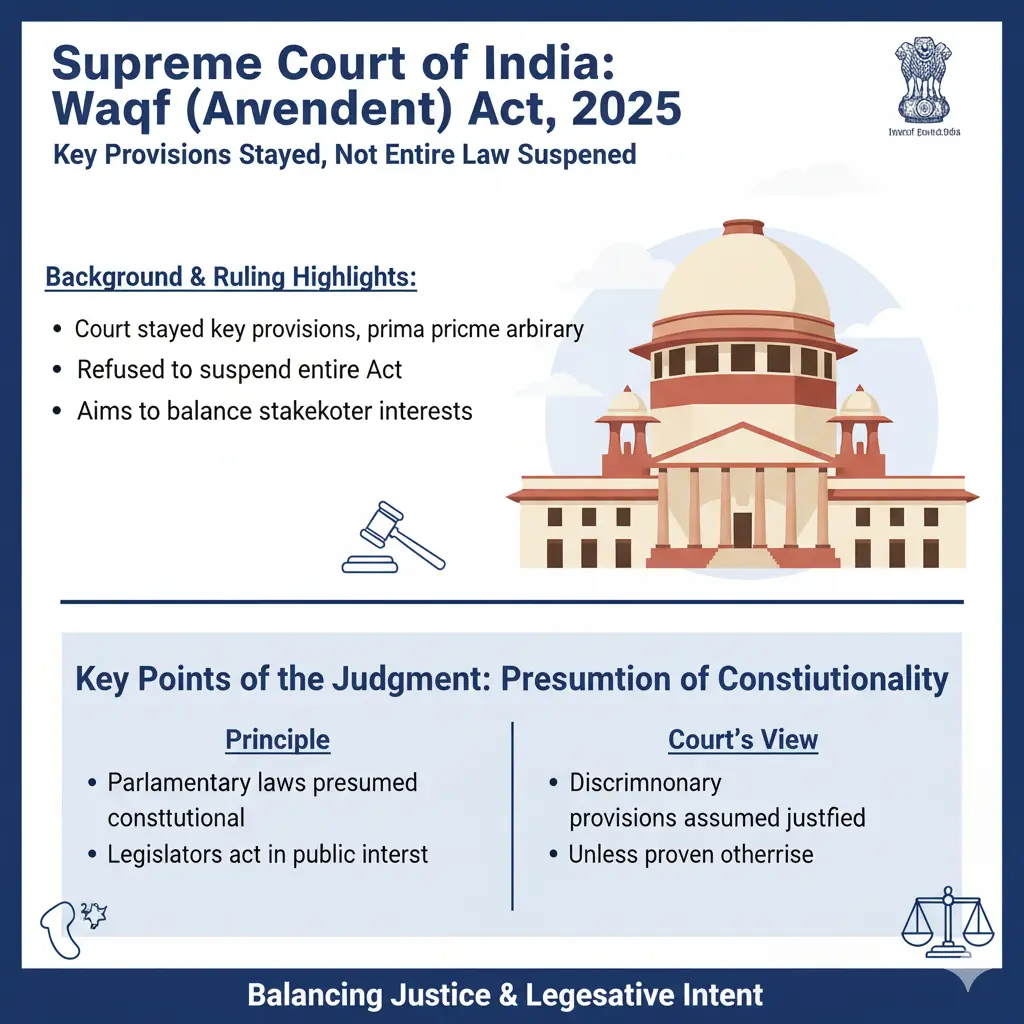September 16, 2025
Waqf (Amendment) Act 2025: 5 Critical Supreme Court Rulings You Must Know
Supreme Court of India : Waqf (Amendment) Act, 2025.
The Supreme Court of India delivered an important ruling on the Waqf (Amendment) Act, 2025.
- The Court stayed certain key provisions of the Act, finding them prima facie arbitrary, while refusing to suspend the entire law.
- This decision aims to balance the interests of various stakeholders while the constitutional validity of the Act is being examined.
Key Points of the Judgment:

Presumption of Constitutionality:
- The Court acknowledged that parliamentary laws are presumed to be constitutional, as legislators are expected to act in the public interest.
- Even if a law contains some discriminatory provisions, they are assumed to be based on adequate justification, unless proven otherwise.
Provisions Stayed by the Court:
- The Court specifically stayed the provision that required:
- Any person creating a Waqf to prove they had been practising Islam for five years.
- This clause was seen as prima facie arbitrary and potentially exclusionary, violating constitutional principles of equality and religious freedom.
Provisions Not Stayed:
- The rest of the Act remains operational, including the registration requirement for Waqf properties and institutions.
- The Court clarified that its interim order only targets certain disputed provisions, not the entire legislation.
Court’s Reasoning:
- The Bench, led by Chief Justice B.R. Gavai and Justice A.G. Masih, noted:
- There is nothing inherently wrong with requiring evidence of genuine religious intent to prevent misuse of Waqf properties.
- However, mandatory five-year proof may be too restrictive and could unfairly deny rights to individuals or groups.
- The Court emphasized that Waqf properties have historically been misused, sometimes as a “device to tie up property” to avoid legal obligations, making careful regulation essential.
Significance of the Decision:
- Balances rights and regulation: Protects the integrity of Waqf institutions while preventing arbitrary restrictions.
- Protects religious freedom: Ensures that genuine creators of Waqf are not unfairly excluded by rigid rules.
- Sets the stage for deeper review: The final decision on the Act’s validity will be made after detailed hearings and arguments.
Next Steps:
- The Court clarified that its observations are prima facie (initial) and do not preclude further arguments.
- Parties can still present detailed submissions on the constitutionality of different provisions in the coming hearings.
Daily Gist of The Hindu/Indian Express: 6 Oct 2025
October 6, 2025
Daily Gist of Article /The Hindu /Indian Express: 24 Sep 2025
September 24, 2025
Gist of Daily News Papers Articles/The Hindu /Indian Express-23 Sep 2025
September 23, 2025
Daily Article Gist/The Hindu/22 Sep 2025
September 22, 2025
